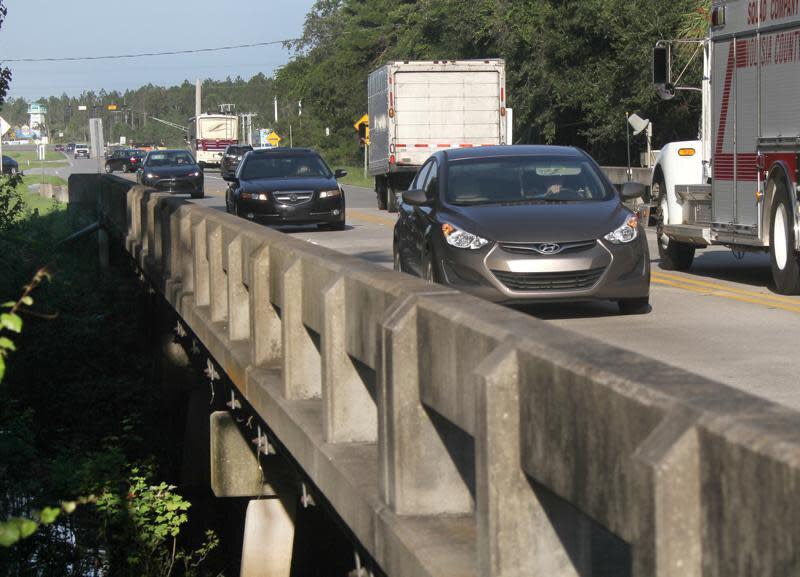Military vets square off in Volusia County Council at-large race
DAYTONA BEACH — This is the first time both Jake Johansson and Doug Pettit have run for an elected position. Both spent their younger years living in places outside of Volusia County.
Each has extensive military experience. Johansson spent 35 years in the Navy. He commanded a combat squadron in Iraq and a Naval base in Norfolk, Virginia, where there is one of the largest concentrations of military personnel in the world.
Pettit is a retired U.S. Marine with 26 years of military service that included serving in Operation Desert Shield and Operation Desert Storm in 1990 and 1991.
Both want to preserve Volusia County's remaining untouched lands, and they want to be good stewards of taxpayers' money.
So what distinguishes the two men facing off in the Nov. 8 election to determine who the county's next at-large representative will be?
Pettit is 68 years old, mostly retired and has worked as a coach, teacher and business owner. Johansson is 59 years old, was the city manager of Port Orange for five and a half years, worked at the Pentagon and carried the nuclear football in the White House for three years, and is currently working as a leadership consultant mostly doing executive coaching.
Johansson is supported by current at-large County Councilman Ben Johnson, and Pettit has the backing of County Chair Jeff Brower. Johnson and Brower often disagree on issues and have had tense exchanges at Council meetings.
Johansson is focused on being careful with the public's money, but Pettit said he wouldn't support any kind of increase to property taxes or sales taxes.
How it came down to Johansson versus Pettit: It's Jake Johansson and Doug Pettit in runoff for Volusia County Council at-large seat
Read more about Pettit and Johansson on growth: Where do at-large Volusia Council candidates stand on exploding growth?
More on Johansson's and Pettit's views: Volusia County Council candidates debate growth, housing, roads, water
Johansson has amassed $114,549 in campaign contributions, with some of it coming from power players in Volusia County: Hyatt and Cici Brown; Charlie Lydecker and his Foundation Risk Partners insurance firm; two NASCAR-affiliated businesses; and the political committee controlled by state Rep. Tom Leek.
Pettit has raised $34,264 which mostly came from numerous smaller donations and $6,500 of his own money. Johansson put $10,000 of his money into his campaign coffers.
Johansson and Pettit emerged as the top two vote-getters in the four-candidate Aug. 23 primary election race for the at-large post. Johansson finished on top with 33.88% of votes cast, and Pettit was second with 23.72% of votes in the battle to determine who will get a four-year term representing residents throughout the county.
Reimagining Volusia County fairgrounds
Johansson and Pettit were asked what they thought of two proposals that County Council members discussed and voted on at their Sept. 20 meeting: raising impact fees and transforming the Volusia County fairgrounds into an outdoor entertainment and recreation hub.
At their meeting last week, County Council members voted to explore using the 20-acre fairgrounds site on State Road 44 near Interstate 4 for an open-air arena, sports complex with multiple fields and courts, splash park, kayak ramp, walking and running paths, early Florida historical village, environmental educational center, new landscaping, shaded rest areas and RV park.

Pettit would love to see an amphitheater that draws people from both Volusia County and other parts of Florida. He said he hates having to drive to St. Augustine or Orlando for a concert or other types of entertainment.
Pettit said some of the ideas Council members have started to consider "may not be practical in that area." But he thinks it's a good place to create a regional arts and entertainment center.
"We could bring in big name acts," he said. "We have the space, it's not near homes and it could be used year round."
He said it could become an economic driver.
He would consider supporting recreational uses of the site "if you can prove to me it's viable."
"If it's too far from residential areas it may not be used," he said.

Johansson said funding will be a challenge, but he thinks "making better use of the (fairgrounds) land if you can is a great idea."
He would want to start any kind of site makeover by gathering plenty of public input from a wide variety of residents and stakeholders.
"Sit down with a facilitator and ask what they think the place should be," he said.
He said public meetings on the fairgrounds' future should be held at times that would be convenient for residents.
Should Volusia's impact fees be raised?
Council members also decided they're interested in raising impact fees. They'll vote on specific increases at an upcoming meeting.
Impact fees were adopted in Florida in 1986 as a way to require new development to pay a proportionate share of public infrastructure costs spurred by the development. The fees are a one-time charge on new development usually collected at the time of building permit issuance.

While developers write the check for impact fee payments, it's really the owner of a new home or commercial building who pays the cost that gets wrapped into their property sale, Johansson said.
"If you think it's a stick-it-to-the-developer thing you're misinformed," Johansson said. "I'm all for raising impact fees, but they are not going to solely fix our problems."
He said starter homes and workforce homes shouldn't be charged as much in impact fees as larger, higher-end houses.
"We can't gentrify our county," Johansson said.
He said impact fees should be reviewed every three to five years, and they should be raised or lowered as needed in a particular period.
"We've got to make sure we're transparent and explain to people why we're not raising them or why we're raising them a little," he said. "It's back to making sure the public understands."
Pettit said impact fees have been stagnant for too many years and need to be raised. He also thinks it's time to review how the fees are assessed, including whether increases should be phased in.
"I would be more inclined to look at the size of a development versus the size of a house," Pettit said. "A larger development will impact the area more and create more demand for police, fire, sewer, roads."
At their last meeting, County Council members discussed adding a new emergency medical services impact fee, and Pettit said that's something he could probably support.
You can reach Eileen at Eileen.Zaffiro@news-jrnl.com
This article originally appeared on The Daytona Beach News-Journal: Volusia Council at-large seat will be filled by Pettit or Johansson.

